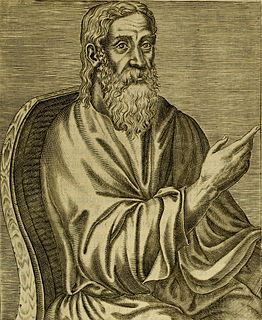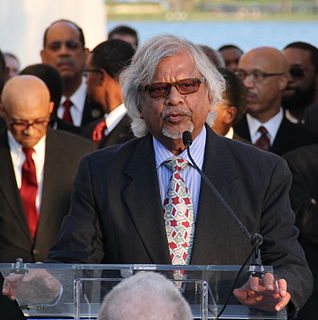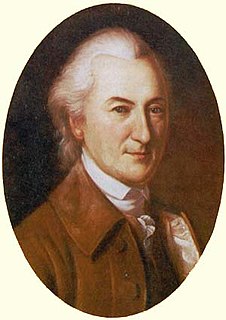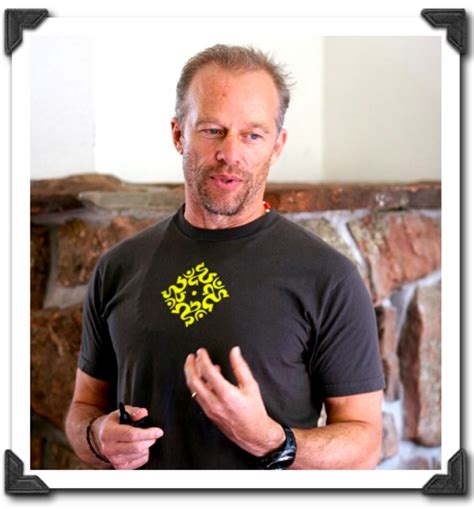A Quote by Clement of Alexandria
Our whole life can go on in observation of the laws of nature, if we gain dominion over our desires from the beginning and if we do not kill, by various means of a perverse art, the human offspring, born according to the designs of divine providence; for these women who, in order to hide their immorality, use abortive drugs which expel the child completely dead, abort at the same time their own human feelings.
Quote Topics
Related Quotes
Understanding human nature must be the basis of any real improvement in human life. Science has done wonders in mastering the laws of the physical world, but our own nature is much less understood, as yet, than the nature of stars and electrons. When science learns to understand human nature, it will be able to bring a happiness into our lives which machines and the physical sciences have failed to create.
Surrendering completely to love, be it human or divine, means giving up everything, including our own well-being or our ability to make decisions. It means loving in the deepest sense of the word. The truth is that we don't want to be saved in the way God has chosen; we want to keep absolute control over our every step, to be fully conscious of our decisions, to be capable of choosing the object of our devotion.
Even in a jungle, lovely flowers will spring up here and there, such being the fecundity of nature, and however badly our pastors and masters run our society, however much they pull to pieces that which they claim to be keeping intact, nature remains fecund, human beings are born with human traits, sometimes human strength outweighs human weakness, and human grace shows itself amid human ugliness. ‘In the bloodiest times,’ as our play has it, ‘there are kind people.’
Human intellectual progress, such as it has been, results from our long struggle to see things 'as they are,' or in the most universally comprehensible way, and not as projections of our own emotions. Thunder is not a tantrum in the sky, disease is not a divine punishment, and not every death or accident results from witchcraft. What we call the Enlightenment and hold on to only tenuously, by our fingernails, is the slow-dawning understanding that the world is unfolding according to its own inner algorithms of cause and effect, probability and chance, without any regard for human feelings.
Mistaken
regard for what are believed to be divine laws and a sentimental belief in the sanctity of human
life tend to prevent both the elimination of defective infants and the sterilization of such adults as
are themselves of no value to the community. The laws of nature require the obliteration of the
unfit and human life is valuable only when it is of use to the community or race.
The moral problem of abortion is of a pre religious nature because the genetic code is written in a person at the moment of conception. A human being is there. I separate the topic of abortion from any specifically religious notions. It is a scientific problem. Not to allow the further development of a being which already has all the genetic code of a human being is not ethical. The right to life is the first among human rights. To abort a child is to kill someone who cannot defend himself.
The miracle of Bach has not appeared in any other art. To strip human nature until its divine attributes are made clear, to inform ordinary activities with spiritual fervour, to give wings of eternity to that which is most ephemeral; to make divine things human and human things divine; such is Bach, the greatest and purest moment in music of all time.
So many people around the world have used nonviolence as a way to resolve a conflict that they faced in their lives. And they continue to use it everywhere all over the world there. And I think, in a way, nonviolence is our nature. Violence is not really our nature. If violence was our nature, we wouldn't need military academies and martial arts institutes to teach us how to kill and destroy people. We ought to have been born with those instincts. But the fact that we have to learn the art of killing means that it's a learned experience. And we can always unlearn it.
Kings or parliaments could not give the rights essential to happiness... We claim them from a higher source - from the King of kings, and Lord of all the earth. They are not annexed to us by parchments and seals. They are created in us by the decrees of Providence, which establish the laws of our nature. They are born with us; exist with us; and cannot be taken from us by any human power, without taking our lives.
If yoga is about life, this means ALL life, not just part of it. Together, the spiritual and the material constitute the whole you, the whole of the experience of being human, and the nature of the universe in which you live. There may be no step more important to achieving ultimate fulfillment than accepting what the Vedas teach us about desires--that some desires are inpsired by your soul.





































